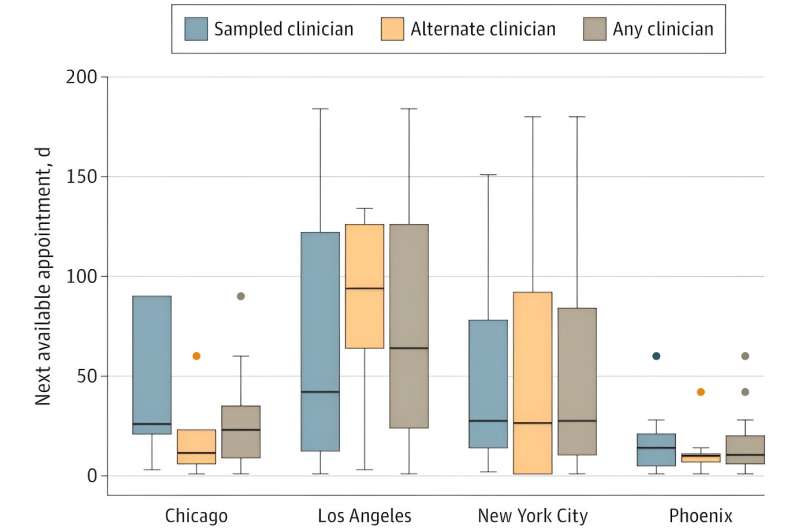This article has been reviewed according to Science X's editorial process and policies. Editors have highlighted the following attributes while ensuring the content's credibility:
fact-checked
peer-reviewed publication
trusted source
proofread
Study finds low availability of psychiatric appointments for Medicaid patients

Many people enrolled in Medicaid who require psychiatric care have difficulty accessing clinicians in a timely manner despite the higher need in this population, according to a study by researchers at Weill Cornell Medicine.
The results published July 31 in JAMA found that few psychiatrists and other mental health professionals who are listed as accepting new patients enrolled in Medicaid are actually reachable and have appointments available.
In cases when appointments could be made, wait times sometimes extended up to six months. The research was conducted by first author Dr. Diksha Brahmbhatt (M.D. '24), who is now a resident physician at Brigham and Women's Hospital, and senior author Dr. William Schpero, assistant professor of population health sciences.
The research team conducted a "secret shopper" study, calling randomly selected psychiatric prescribing clinicians (psychiatrists, nurse practitioners and physician assistants) listed in provider directories for Medicaid managed care plans in New York City, Los Angeles, Chicago and Phoenix. The researchers asked for the earliest available appointment for treatment of depression with the sampled clinician; when not available, an alternate clinician was requested.
Difficulty in making appointments
Across the four cities, only 18% of the sampled clinicians—all of whom were listed as in-network for Medicaid—were reachable, accepted Medicaid and offered an appointment.
While New York City had the highest appointment availability (36% of offices called offered an appointment with the sampled clinician or an alternate), it had a median wait time of 28 days. On the other end of the spectrum, only 15% of calls seeking an appointment in Los Angeles were successful, and the median wait time was 64 days.
Of the 263 sampled clinicians with whom appointments could not be made, 15% had incorrect or out-of-service phone numbers, and 35% did not answer the phone on either of two call attempts. Though the researchers did not compare appointment availability for patients with Medicaid relative to commercial insurance, other studies have established that Medicaid enrollees have lower access to psychiatric care than those with private coverage.
Need for greater enforcement
"We've long known that relatively few psychiatrists participate in the Medicaid program, which compromises access to necessary care," said Dr. Schpero, who is also co-associate director of the Cornell Center for Health Equity.
"This is compounded by the issue identified in our study: even among psychiatrists listed as participating in Medicaid, actual access to care is apparently quite low."
The results suggest that despite recent regulations from the Centers for Medicare & Medicaid Services that require states to perform "secret shopper" surveys evaluating access to care for Medicaid enrollees, greater enforcement is necessary to ensure they are receiving the treatments they need.
"Most states have outsourced the provision of the Medicaid benefit to private health plans," Dr. Brahmbhatt said.
"It is up to states—with guidance and oversight from the federal government—to ensure these plans construct networks of mental health professionals who don't just participate in Medicaid on paper, but meaningfully make appointments available to enrollees."
More information: Diksha Brahmbhatt et al, Access to Psychiatric Appointments for Medicaid Enrollees in 4 Large US Cities, JAMA (2024). DOI: 10.1001/jama.2024.13074


















